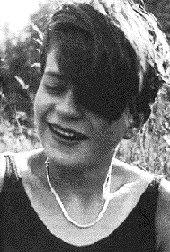Born on May 9, 1921, when her father was mayor of Forchtenberg am Kocher, Sophie Scholl was the fourth of five children. At age seven she entered grade-school; she learned easily and had a carefree childhood.
*
In 1930, the family moved to Ludwigsburg and two years later to Ulm, where her father had acquired a business consulting office.
*
In 1932, Sophie started [attending] a secondary school for girls. At the age of twelve, she joined the Hitler Youth, like most of her classmates. Her initial enthusiasm gradually gave way to criticism. She was aware of the dissenting political views of her father, of friends, and also of some teachers. The political attitude now became an essential criterion in her choice of friends. The arrest of her brothers and friends in 1937 left a strong impression on her.
*
She had a talent for drawing and painting and for the first time came into contact with a few so-called 'degenerate' artists. An avid reader, she developed a growing interest philosophy and theology. This was her alternative world to National Socialism.
*
In the spring of 1940, she graduated from secondary school. The subject of her essay was 'The Hand that Moved the Cradle, Moved the World.' Being fond of children, she became a kindergarten teacher at the Fröbel Institute in Ulm-Söflingen. She had also chosen this kindergarten job hoping that it would be recognized as an alternate service to 'Reichsarbeitsdienst' (National Labor Service), a prerequisite to be admitted to the University. This was an error: from spring of 1941 on, she had to serve six months of auxiliary war service as a nursery teacher in Blumberg. The military-like regimen of the Labor Service caused her to deliberate and practice passive resistance.
*
In May 1942, at long last, she could enroll at the University of Munich as a student of biology and philosophy. Her brother Hans, who was studying medicine there, introduced her to his friends. Although this group of friends were eventually known for their political affairs, they were initially drawn together by a shared love of art, music, literature, philosophy and theology. Hiking in the mountains, skiing and swimming were also of importance. They often attended concerts, plays and lectures together.
*
In Munich Sophie met artists, writers and philosophers, particularly Carl Muth and Theodor Haecker, who were important contacts for her concern with the Christian faith. Of foremost importance was the question of how the individual must act under dictatorship.
*
During the summer vacation in 1942, Sophie Scholl had to do war service in a metallurgical plant in Ulm. At the same time, her father was serving time in prison for a critical remark about Hitler to an employee.
*
In the early summer of 1942, Sophie had also participated in the production of the leaflets of the White Rose and their distribution. She was arrested on February 18, 1943, while distributing the sixth leaflet at the University of Munich. On February 22, 1943, Sophie, her brother Hans and their friend Christoph Probst were condemned to death and executed by guillotine only a few hours later.
*
Prison officials emphasized the courage with which she walked to her execution.Auf der Rückseite der Anklageschrift, die sich nach ihrer Hinrichtung in Sophies Zelle findet, steht das Wort „Freiheit“.
